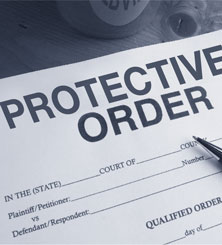 What happens if one of my tenants obtains a protective order against another tenant in the same unit?
What happens if one of my tenants obtains a protective order against another tenant in the same unit?
We recently came across a situation where a female tenant—let’s call her Sue—filed for and obtained a protective order against a male tenant—let’s call him Dave—living in the same unit. Our client, the property manager, had several questions:
Can Sue terminate her lease early for her safety?
Yes. The Indiana Code stipulates that Sue can terminate the lease agreement by providing the landlord with thirty (30) days written notice. Depending on the circumstances, the notice may also need to include a copy of the protective order, the criminal no-contact order, or a safety plan provided by an accredited domestic violence or sexual assault program. Sue will be liable for the rent and other expenses due under the rental agreement prorated to the effective date of the lease termination, which is payable at the time specified in the lease. For example, most leases say that rent is due on the first (1st) of the month. Sue would also be exempt from any “early-termination” fees under the lease agreement.
Can I evict both tenants?
No. A landlord may not terminate a lease, refuse to renew a lease, refuse to enter into a lease, or retaliate against a tenant solely because a tenant, an applicant, or a member of the tenant’s or applicant’s household is a protected individual. Nor can a landlord terminate a lease, refuse to renew a lease, refuse to enter into a lease, or retaliate against a tenant solely because a tenant, an applicant, or a member of the tenant’s or applicant’s household has terminated a rental agreement as a protected individual under the Indiana Code.
Can I evict Dave once Sue has left?
Maybe. The rights and obligations of Dave under the lease agreement continue unaffected even though Sue has terminated her rights and obligations under the lease. Throughout the entire process, Dave remains liable under the lease for rent and for the cost of damages to the unit. Once Sue has moved out, assuming Dave is not violating the terms of the protective order, he can move back into the unit. Then, the only grounds for evicting Dave are the normal grounds for eviction under the lease (e.g., failure to pay monthly rent, damage to the property, etc.). If Dave elects not to move back into the unit after Sue has moved out, the landlord could take possession back of the unit under the abandonment terms of the lease.
How do I handle the security deposit?
The Indiana Code says that Sue is entitled to deposits, returns, and other refunds as if the tenancy terminated normally under the terms of the lease. This would apply if it were just Sue living in the unit. In situations where there are multiple tenants, like our example here, the Code states that a landlord is not obligated to return or account for any security deposit associated with the rental agreement until forty-five (45) days after the tenancy of all tenants has terminated.
Other things landlords should be aware of:
Locks: Depending on the circumstances, there are requirements for changing the locks of the unit. The protected individual must first make a written request upon the landlord for changing the locks. As long as the landlord performs its duty timely, the protected individual is liable for the cost of the lock change.
Waiver is void: A landlord or current or former tenant cannot waive these rights and obligations by contract or otherwise.
It is important to remember that every situation is unique. It is a prudent business practice to contact your attorney promptly, so as to be sure you are fulfilling your obligations under the law.